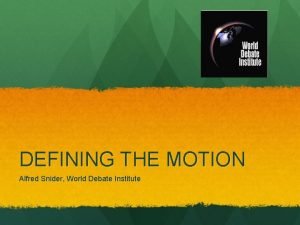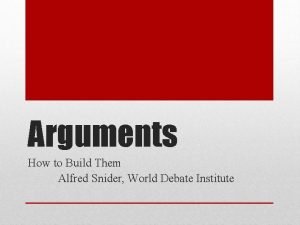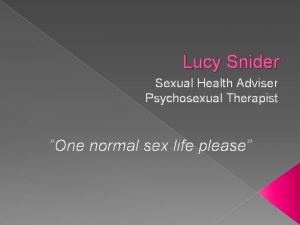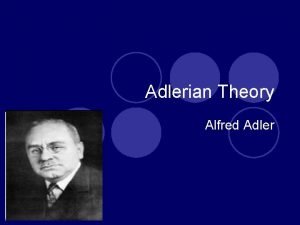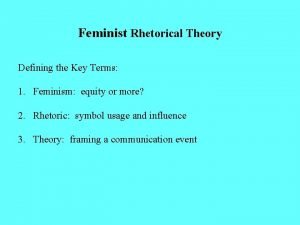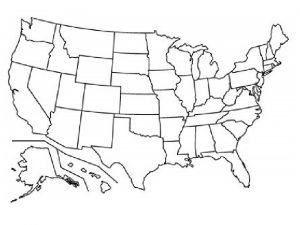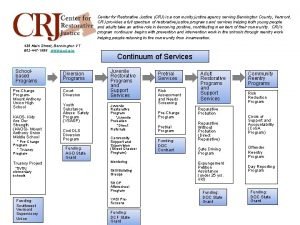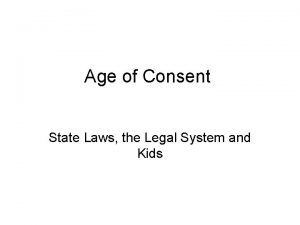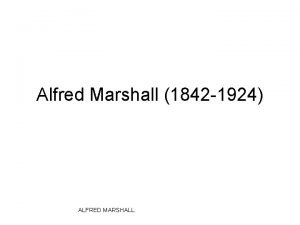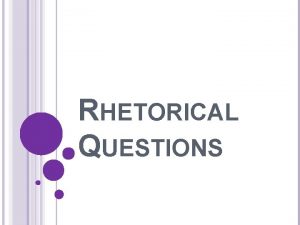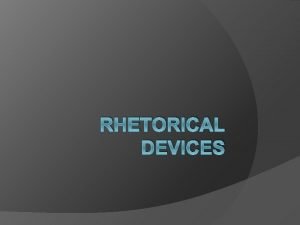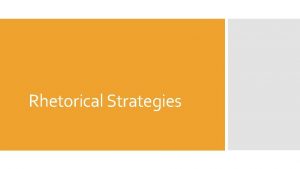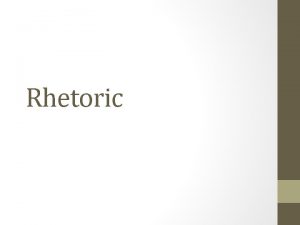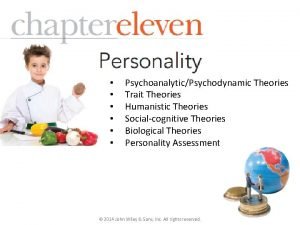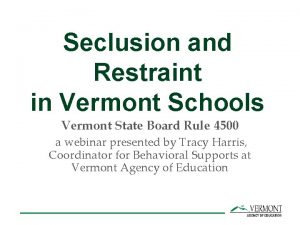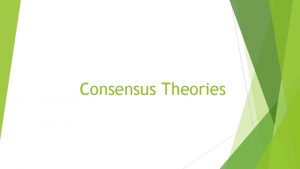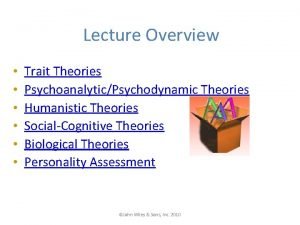African Rhetorical Theories Alfred Snider University of Vermont






















- Slides: 22

African Rhetorical Theories Alfred Snider, University of Vermont Rthetoric of Reggae Musi

West is the Best? Consumerist approach to rhetoric pressed into the service of vulgar persuasion, advertisement, seduction and sales. “Selling soap to the clean. ” Modern Eurocentric rhetoric has abandoned the classical Aristotelian rhetoric of deliberation and action in the interest of the polis, but has also ignored and denied contributions from other cultural traditions.

African Approach In this African conception of rhetoric it is a practice of communal deliberation, discourse and action oriented towards what is good for the community and for the world. This essence of community is both expressed in the goal of the rhetoric but also in the practice of the rhetoric. It is designed to help bring good into the world. The Odu Ifa of Yoruba land claims: “Humans are divinely chosen to bring good into the world, ” that is their mission and communication is the way that they do that. They are uniquely situated among living creatures to do this.

Kawaida Philosophy What Africa has to offer to the understanding of human communication in the interest of benefiting all humanity. We should engage in ancient and modern traditions, written and practiced, oral and other forms. It has traditionally been concerned with building community, affirming human dignity and enhancing the life of the people. More recently, it has been a rhetoric that concerns itself with struggles for liberation in the political, economic and cultural senses as well as a rhetoric of resistance.

It Is Communal It is a rhetoric of resistance, formed in the crucible of struggle. It is not just about African people, but also about all of humanity. It is the rhetoric of reaffirmation, for African peoples as well as all of those who are not considered fully human. It is also a rhetoric of possibility, about what we can do that is new as well as what is traditional.

Kemet - Egypt It was African, not European. It was not a huge slave society, free people who volunteered their work built the pyramids. Europeans needed it to be “slave” because of what they had done with slavery. It was the basis for much of so-called “western” civilization. The great works of law, medicine, and rhetoric began there, not in Greece thousands of years later. Hippocrates admits in his text that he is a servant to the great Kemetic healer Imhotep.

Nommo is the creative power of the word. While conceptually rooted in the rhetorical teachings of classical Kemet, the word itself comes from the traditions of the Dogon people of central Africa. The creator spirit sends Nommo to the world in the form of speech to assist humans in the forward movement of history and the reorganization of the world. It is through the word that we develop weaving, forging, cultivating, building family and community and making the world better, bringing good into the world. Nommo is the unity of water, earth and fire, and the unity between male and female.

Karenga on Nommo It is this sacred, indispensible, and creative character of the word, as an inherent and instrumental power to call into being, to mold, to bear infinite meanings, and to forge a world we all want and deserve to live in, that seizes the hearts and minds of the African American creative community and becomes a fundamental framework for developing, doing, and understanding rhetorical practice – both its oral and literary forms.

Molefi Kete Asante Africans brought a sophisticated oral style to the western hemisphere Africans brought with them a different rhetoric, not just a concern with influence and ends African Jamaican rhetorical tradition retained and further developed the concept of nommo, Jamaicans understand the transforming power of vocal expression. Because Africans were denied reading and writing they learned to rely on the spoken word. The enslavement experience stands astride all discourse like colossus, whereas the discourse might be about discrimination or voting rights, but the slave experience is at its basis.

Ancient Kemet Speech is conceived as an ethical activity, because it is a tremendous power that can be used for good or evil. For them, a “good” speech is not just effective, but is also ethically and morally good. Maat is the Kemetic standard for what is “morally good. ” In application to speech, Maat means that it is truthful speech. Truthful speech creates its own ethos and is in and of itself persuasive. This stands in contrast to the artifice and dissimulation that is so important in modern western rhetoric that has been put to the service of seduction and sales.

Book of Ptah Hotep & Maat The central focus of the book is a narrative about the calls petitions for justice from a normal peasant named Khaunanup. He makes a number of appeals to figures in power and these demonstrate the speech that is both “moral” and “effective. ” The point here is that rhetorical eloquence is not necessarily that used by leaders and important people, but by all people – peasants, servants (and men and women) can be rhetorically eloquent, and are expected to be so. It is no surprise that the model orator in this Kemetic text is a farmer.

Maat Applied Humanity is seen as a spiritual force. In African rhetoric there is no line of demarcation between the spiritual and the secular. The speaker calls all of us to go to a higher place and improve ourselves not just as physical but as spiritual beings. Communication is the way that moral and spiritual ideas are transmitted. If the greatest spiritual law is the law of love, then great communication events are examples of this. Asante has said that there are no speeches by hatemongers that have gone down in history as great speeches. There will never be any, because the overwhelming judgment of history is a moral one and the speaker who imperils the forward march of human dignity will not live in the minds of the future. It is the champion of righteousness who is the true victor in rhetoric.

Rhetorical Focus The African culture tends to be a very oral one, and thus rhetoric is paramount in its importance for the human spirit, for the benefit of human conditions and in the achievement of personal and social harmony. African rhetoric does not compartmentalize rhetoric, poetry, literature, prose and drama. All these forms are interwoven into a discourse designed to achieve important goals and ends.

Canons of Kemetic Rhetoric Silence (self control) Good timing Restraint Fluency Truthfulness

Ethics & Africa

Four Ethical Concerns 1. The ethical concern for the dignity of every human person is a fundamental aspect of rhetorical practice. 2. Well being and flourishing of the community. 3. Integrity and value of the ecology. 4. Reciprocal solidarity and cooperation of all humanity.

These Ethics in Action The Book of Ptathhotep, there are examples: “He who does justice for all the people, he is truly the prime minister. ” Leaders and speakers must stand for and speak for all marginalized and oppressed people as well as those in the mainstream who are privileged. Doing good leads to solidarity. “A good deed is remembered, ” and also, “do to the doer that he may also do. ”

Solidarity, Communication and Doing Good When Maat is a part of rhetoric, it leads to two kinds of solidarity: Solidarity of action; Solidarity of understanding. These are both achieved through communication. Lady Ta-Aset says: “Doing good is not difficult; just speaking good is a monument for one who does it. For those who do good for others are actually doing it for themselves. ” In the Dogon text, it is written that, “Doing good worldwide is the best example of character. ”

Aesthetics & Rhetoric language is art. Art is not for the purpose of artistic expression and creativity, but is always functional. In the west we separate art from life, but this is not the African conception. It is not the product of the artistic activity, but the process that is important. That process is always a part of living. Call and response example. Many others will be examined.

Orality vs. Text Immediate and direct. Speaker and audience are one. It is common and everyday, not isolated and elevated. It is spontaneous and not rehearsed. It is improvised for the purpose and situation. It allows individuality to flourish in a group context.

Other Features Indirection. Speech as play. Signifying. “Yes, Massa. ” “Mr. T. ” Meaning is in context, culture as well as in the speaker. Many more markers.

Conclusion Rhetoric is powerful. Frederick Douglass, said: Great is the miracle of human speech – by it nations are enlightened and reformed; by it the cause of justice and liberty is defended; by it evils are exposed, ignorance dispelled, the path to duty made plain, and by it those who live today, are put into the possession of wisdom of ages gone by.
 Alfred snider
Alfred snider Alfred snider
Alfred snider Jonathan snider md
Jonathan snider md Lucy snider
Lucy snider Strengths and weaknesses of adlerian therapy
Strengths and weaknesses of adlerian therapy Feminist rhetorical theories
Feminist rhetorical theories Vermont association of criminal defense lawyers
Vermont association of criminal defense lawyers Rule 4500
Rule 4500 Capital of maine montpelier vermont
Capital of maine montpelier vermont Crj bennington vt
Crj bennington vt Pine marten vermont
Pine marten vermont Romeo and juliet law vermont
Romeo and juliet law vermont Vermont sheep and goat
Vermont sheep and goat Vermont department of health
Vermont department of health Child development clinic vermont
Child development clinic vermont Medical examiner vs coroner
Medical examiner vs coroner Vermont doh
Vermont doh Central vermont railroad
Central vermont railroad Vermont sheep and goat
Vermont sheep and goat Hans kastensmith
Hans kastensmith Vermont drought monitor
Vermont drought monitor Vermont yankee v nrdc
Vermont yankee v nrdc 435 accident
435 accident
